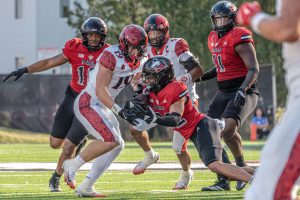Northern Star has gone far since the Roaring ’20s
March 26, 2004
“Out of the cataclysm of the world war come new fellowships, new aspirations. It is ours to make the most of them.”
The above address by President Warren G. Harding was published in a 1921 edition of the Northern Illinois newspaper, which later would become the Northern Star. The issue was published when the Northern Illinois State Teachers College was barely two decades old.
The events of the Roaring ’20s came after a devastating war in Europe and Prohibition that gave rise to a gangster underground. The arrival of jazz and rebellious women known as “flappers” also shaped the cultural landscape of the decade.
Originally published monthly and later bi-weekly, the Northern Illinois’ magazine-like format contained lighthearted news articles, jokes, poems, essays and letters interspersed freely throughout the paper’s “Literary” section.
Jokes in particular made up a substantial amount of the paper’s content – some of them considerably more offensive by today’s standards.
The paper also focused on campus clubs and local entertainment. Decades before a Convocation Center or Ludacris show, students found other sources of entertainment.
“The student activities committee has secured for the students here, as well as the townspeople of DeKalb, Anna Case, a metropolitan opera star,” read one 1922 announcement.
Ads for everything ranging from the Apollo player piano (“Brings to your home the playing of the world’s greatest pianists”) to local photography studios (“A photograph is your picture on paper”) filled nearly every issue of the paper. The phone was such a recent invention that businesses still used three-digit numbers.
Some issues of the period may be familiar to today’s NIU students.
“We are lax about our school spirit, and at times the loyalty for the institution seems to disappear,” complains an unnamed writer in a 1923 article. “We all know that the spirit is not what it should be, nor is it even what it could be … Most of us have completed our high school courses, but we still persist in our high school ways and days, even to the extent of forsaking our college activities and teams for the high school party at home.”






